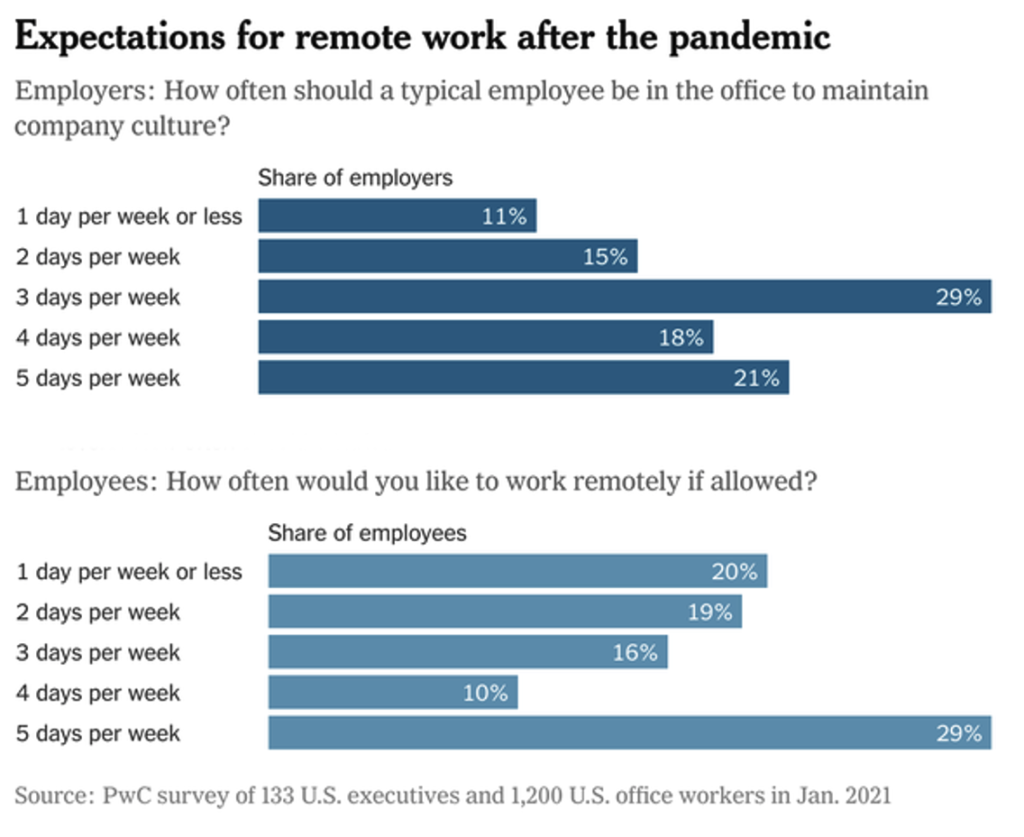
As organizations reopen in varying ways and to varying degrees, one feeling is universal: Uncertainty. In a massive survey of remote workers during the pandemic, 33% of employees and 50% of employers reported increased productivity. At the same time, many people also reported that they struggled with isolation, loneliness, and new work-life issues in their work environment at home. Now everyone is uncertain about which adjustments to make, going back completely or partially
Employers have to figure out how to strike the right balance between “at home” and “in office,” and many are choosing a hybrid model. Ford is having employees plan out their return on a case-by-case basis with their manager, Google is asking for three weeks in office and one week at home each month (the schedule at each employee’s discretion), and Microsoft is doing an even half-and-half.
With this evolving format of working comes a new set of challenges and insights. Over the last month at TalentSmartEQ, we’ve looked into the latest studies and creative thinking to better understand the problems faced by organizations as they reopen. Here are five of the most important insights and five ways that high EQ practices can help your organization address these new challenges in a way that creates a flexible workplace where people are engaged and performing their best.
The Search for Community
When people work from home or work alone, research shows that they tend to seek community outside of work. They look to establish their own routines, cultivate connections to people and places, and develop a sense of purpose in their work. The same research shows that much of this search is boiled down to one thing: People are attempting to find a support network (of people and meaning) that can help them manage the range of emotions they face each day.
The EQ Solution: Workplaces adopting a hybrid approach should foster connection and purpose for those working in-person and remotely. Help remote employees also understand that outside connections and routines are must-haves. Encourage them to set boundaries with work the same way they would in an office. They need time offline to develop the sense of community they need to be happy. The bottom line is that EQ helps people recognize, understand, and manage the range of emotions that they experience every day (wherever they may face them).
Job Satisfaction is about Relationships
No matter how or where you work, one finding stands the test of time: Job satisfaction and work relationships are intertwined. In a massive 100-study review spanning 68 years, job satisfaction was found to be more closely tied to people’s relationships with supervisors and colleagues than even to their preferences for type of job.
The EQ Solution: Emotional intelligence is a powerful way to improve working relationships and the relationship strategies in Emotional Intelligence 2.0 offer practical suggestions for how. In fact, our own research at TalentSmartEQ on nearly two million people shows that those skilled at managing their relationships with others (i.e., fostering new relationships, managing existing ones, developing stronger ones) are more successful and higher performing in the work they do.
Good Online Leaders Literally Lead Differently
A 2020 study set out to look at what kinds of team members were chosen by their co-workers to lead virtual teams. You might expect that the same people chosen in-office were chosen online, but there were differences. For virtual leadership, team members selected for “doers.” Doers were people who excelled at planning, prioritizing, staying on task, and keeping others on task. They selected much less for leaders who were outgoing, charismatic, or inspirational.
The EQ Solution: Now we understand that both “doing” and “inspiring” play a role. Just as EQ skills can help a leader build their natural strengths, EQ skills can also help a leader be more agile by doing more while leading remotely and inspiring more when leading in person. Self-Awareness and Social Awareness skills allow leaders to see what people need and adjust accordingly.

Incentive or Threat: The Great Stand-off Between Employers and Employees
Employees and employers are not seeing eye-to-eye on time spent in the office (just take a look at the image to the right). In an interview, Dr. Tsedal Neeley, a psychologist and professor of business administration at Harvard Business School pointed out that “81% of employees want to retain some kind of remote or virtual work in their repertoire. And according to Gallup polls, up to 35% want to do it full time. At companies on the other hand, about 70% want people back in-person, full time.” This tension has resulted in some extreme reactions. Certain tech companies have gone as far with their incentives as paying people per-day bonuses to come into the office and entering them in a year-end raffle for a Tesla. At worst, one magazine editor threatened that “it’s much easier to fire remote employees than in-person ones.” This led to a full employee strike until he apologized.
The EQ Solution: Have important conversations one at a time. If you’re a manager, you may not have control over your organization’s response to reopening, but emotional intelligence skills can help you traverse that tough conversation in an empathetic and genuine way. If you’re an employee, emotional intelligence skills will help you self-advocate and share how policies or rules make you feel while still maintaining a positive relationship with your manager.
Recruit, Engage, and Retain a Global Workforce
Perhaps one of the most interesting and exciting takeaways from the pandemic is that with remote work, organizations can begin to tap into talent around the world and build teams that aren’t tied to any one location. Of course, managing a team that spans the globe comes with its fair share of unique challenges—like communicating effectively across time zones and cultures.
EQ Strategy: Emotional intelligence is a powerful framework from which people around the world can operate from a common ground with a common vocabulary. Equipped with EQ, they can more quickly and effectively learn to navigate both the simple and the complex challenges faced by a global team. On an individual level, social awareness helps employees tune into the emotions, tendencies, and actions of others. This is essential to establishing trust and to understanding other people’s cultures and mental frameworks.
From Insights to Action. Navigating challenges as we reopen is going to be ongoing and complex. Regardless of how your circumstances may change, EQ skills will help you respond as effectively as possible.
To learn more about emotional intelligence and find practical strategies for improvement, check out our book Emotional Intelligence 2.0 which also comes with a free assessment so you can see how you score and get strategies for improvement based on your results. To learn more about emotional intelligence and TalentSmartEQ’s products and services, contact TalentSmartEQ at 888-818-SMART or visit us at https://www.talentsmarteq.com/contact/.